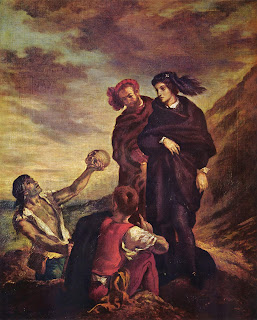There Should be a Name for it but not This One, says Griselda Heppel
Now here’s something I never expected.
I knew there had to be a word for a false collective memory of a line in a film or play, famously always slightly misquoted because it sounds right. ‘Alas, poor Yorick, I knew him well,’ for instance, instead of what Shakespeare actually made Hamlet say, which was ‘Alas, poor Yorick! I knew him, Horatio.’
Or, ‘Play it again, Sam,’ which feels much more prosaic than the haunting, ‘Play it, Sam, play it,’ from a dewy-eyed Ingrid Bergman in Casablanca.
A widespread what?
 |
| Humphrey Bogart and Ingrid Bergman in Casablanca By Trailer screenshot - Casablanca trailer, Public Domain, https://commons.wikimedia.org/ w/index.php?curid=1757187 |
Or, ‘Play it again, Sam,’ which feels much more prosaic than the haunting, ‘Play it, Sam, play it,’ from a dewy-eyed Ingrid Bergman in Casablanca.
So anyway, I googled the phenomenon, of course I did, and you’ll never guess what it’s called. (Well obviously you will if you’re ahead of me.)
It’s called the Mandela Effect.
Eh? Why on earth would a kind of glitch in communal memory that’s been around for centuries be named after the great anti-apartheid campaigner and first black president of South Africa, whose dates are 1918 - 2013?
Because it refers to a widespread ‘memory’ of Nelson Mandela's tragic death in prison in the 1980s.
 |
| Nelson Mandela. By © copyright John Mathew Smith 2001, CC BY-SA 2.0, https://commons.wikimedia.org/w/ index.php?curid=74768082 |
Sorry, I’m having trouble getting my jaw off the floor.
Mandela was one of the most famous political prisoners of all time, his incarceration condemned around the world, and when President F W de Klerk of South Africa released him in 1990, this was major global news. As everyone knows, Mandela went on to negotiate an end to apartheid with de Klerk, leading to the 1994 South African general election, won by Mandela at the head of the African National Congress party.
He served as President of South Africa until 1999 and died in 2013.
Mandela spent 27 years in prison. I can just about grasp the possibility that during those years, during the 1970s and 1980s perhaps, he’d languished in jail so long that some people might have imagined him to have died, even to the point of ‘remembering’ newspaper headlines that said so. But – you may want to hold on to something while you read this next bit – the ‘Mandela effect’ doesn’t date from that time. It was identified in 2009 by someone called Fiona Broome, after she’d attended a conference where she talked with a number of people about their (and her) personal memories of Mandela’s death in prison.
In 2009. Nearly 20 years after Mandela’s triumphant return to the world stage and while he was still alive.
Where had these people been? Where were their brains? It’s not remembering things slightly wrong – like a film quotation say – it’s having lost their memories altogether. Had they all been victims of a Close Encounters of the Third Kind type kidnapping and only just been returned to Earth, en masse, in time for this seminal conference?
Sorry, this has thrown me. I was going to write about a fascinating ‘false cultural memory’ I’d come across recently but have been so distracted by the great Nelson Mandela’s being shoehorned into such a trivial human foible that it’ll have to wait for next month.
I can’t even bring myself to call it the Mandela Effect. Can’t we call it the Casablanca Effect instead?

Comments
As for your English teacher… she didn’t miss a trick, did she? I’ll have to go back and check the original Alexander Pope line. It is Pope, isn’t it? Now I’m beginning to lose confidence..